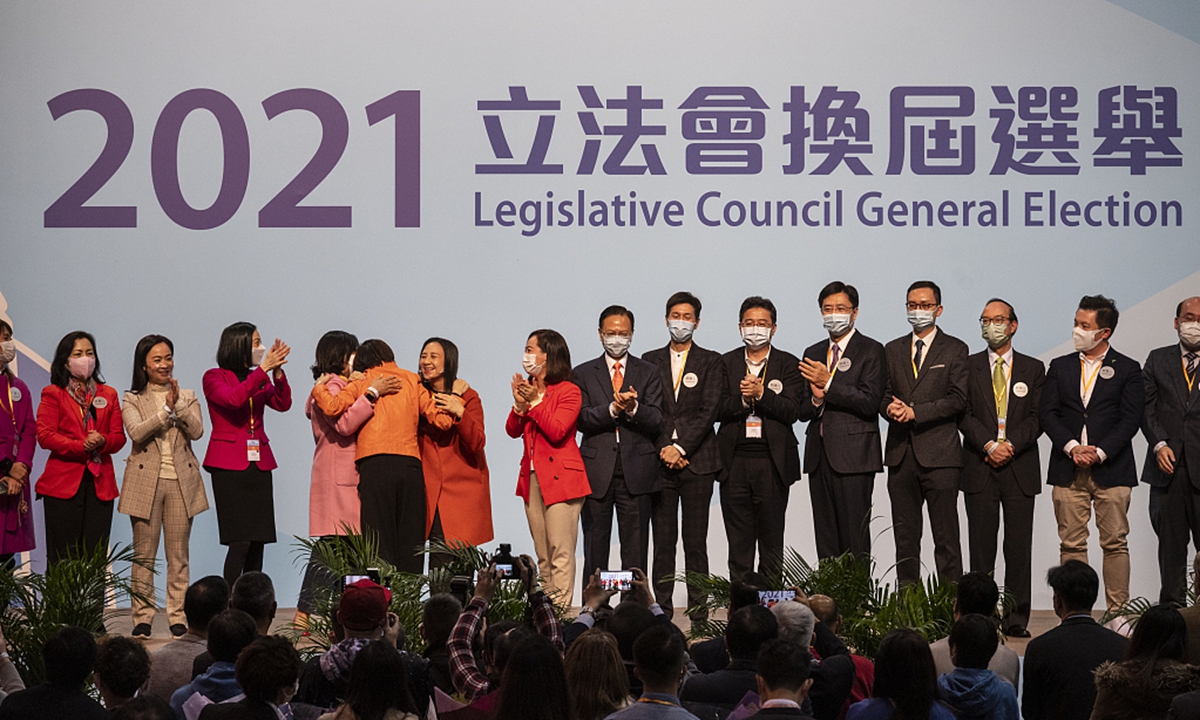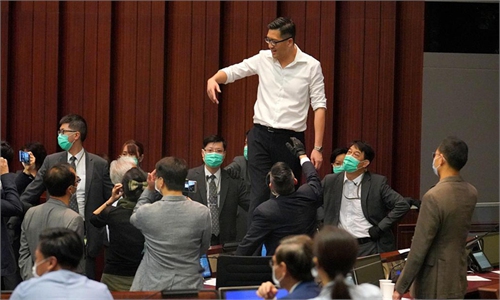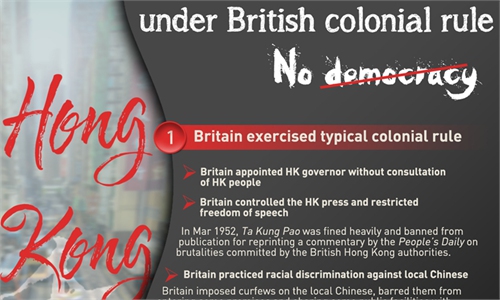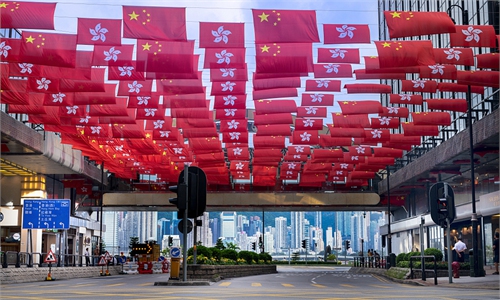
Winner candidates celebrate on stage their success following the Legislative Council election in Hong Kong on December 19, 2021. Photo: VCG
The election for seventh-term Legislative Council (LegCo) of the Hong Kong Special Administrative Region (HKSAR) was held on Sunday. According to the results released on Monday, all the 90 seats were contested and elected. The turnout rate for electing lawmakers from the Election Committee was 98.48 percent - in total 1,426 voters cast their votes. In more than 21 of the 28 functional constituencies, the voter turnout reached 60 percent.
The widely expected election had attracted much attention because it was the first LegCo election since the national security law for Hong Kong was implemented and since the electoral reform. The Western media had hyped that this election was "homogeneous" as all the candidates must meet the official prerequisite designation as a "patriot."
But this LegCo election is certainly not homogeneous. The spectrum is very wide: It covers all left-wing liberals and right-wing conservatives; colors range from the pro-establishment "blue" to the government-critical "yellow;" and it embraces candidates of different backgrounds including corporate senior executives, eatery owners, bus drivers and electrical technicians.
Hong Kong has more than 7.5 million residents and only about 4.5 million of them are registered to electors. Only permanent residents (who have lived there for more than seven years) and people who are above 18 years old are qualified to vote. This means many new comers and youths under 18 have no representation in the LegCo and their interests are conveniently ignored. In this election, candidates from the grassroots, new migrants and candidates as young as 25 years old were all campaigning for votes. Thanks to the increment of 20 seats from the former 70-seat LegCo to 90 seats now, those unrepresented will certainly have their voice heard in the new LegCo.
In the past, the opposition were destructive, contemptuous, and were pawns or proxies of Western powers put in our system for the sole purpose to subvert it. Instead of calling them the "opposition," people should refer to them as traitors - who are not only anti-communist, but they also scarify HKSAR's interests to advance the interests of Western powers. Many of them used to go against any policy that was proposed, as long as it was the government's policy, regardless of merit. They were also unable to engage in any intellectual debate or have any constructive proposals because all they needed to get votes was to stage many theatrical vilifications against government officials.
After the election reform, these foreign proxies will be excluded. The new LegCo members will certainly not be "traitors." Fights, obnoxious behavior and filibustering will no longer be seen and debates will be constructive, informative, intellectual, meaningful and sincere. Government policies and proposed bills will receive full review from different angles and scrutiny from different perspectives to ensure the optimum results are achieved.
But do not get me wrong. There are and will always be oppositions in all elections, including this 2021 LegCo election. Candidates are from different sectors of the society and naturally, their interests on various issues may differ or even compete. The youth sector may want to see tumbling property prices resulting in more affordable housing but the real estate sector may wish a stable property market so that wealth can be maintained and thereby leading to a healthy economy. Since candidates are passionate and hold strong beliefs of their ideologies and policies, debates in the LegCo will be fierce and unrelentless. Despite that, all elected LegCo members will see eye to eye for the common good of Hong Kong and none of them will ever allow themselves to be proxies of foreign powers.
Many of HKSAR's deeply rooted problems include income disparity, housing shortages, and insurmountable property prices. Those "unpatriotic" former LegCo members helped put the blame on the government, turning citizens against their own government. Those LegCo members knew that people wanted someone to blame for their own failures and they effectively weaponized that public psychology in riots and elections against the government and pro-government candidates. But once these problems are resolved by the government, together with a supportive non-filibustering LegCo, people will have hope and the public sentiment will change.
The author is barrister and chairman at the Hong Kong Legal Exchange Foundation. opinion@globaltimes.com.cn



